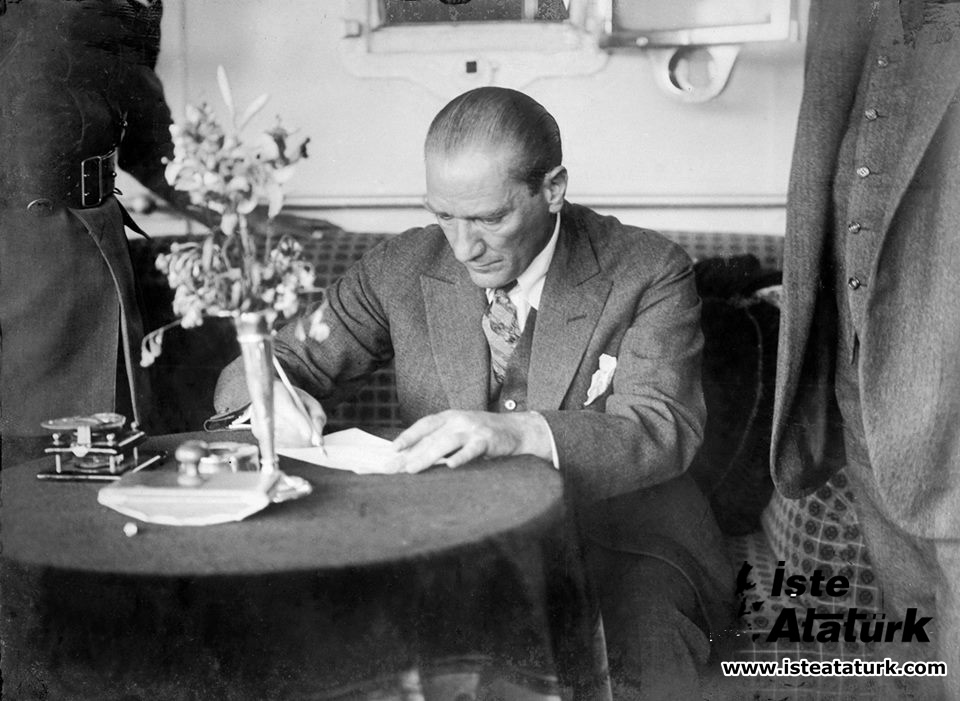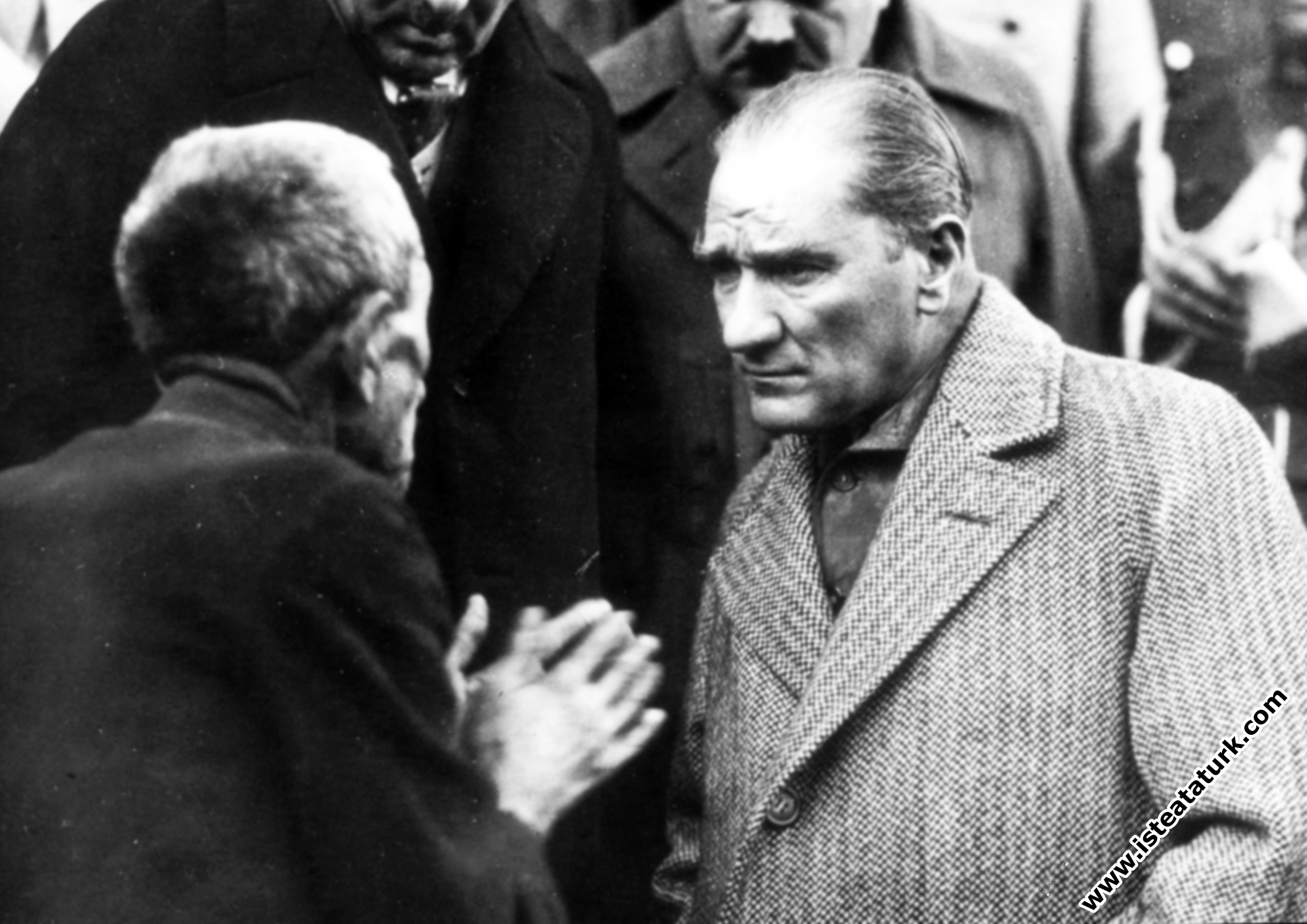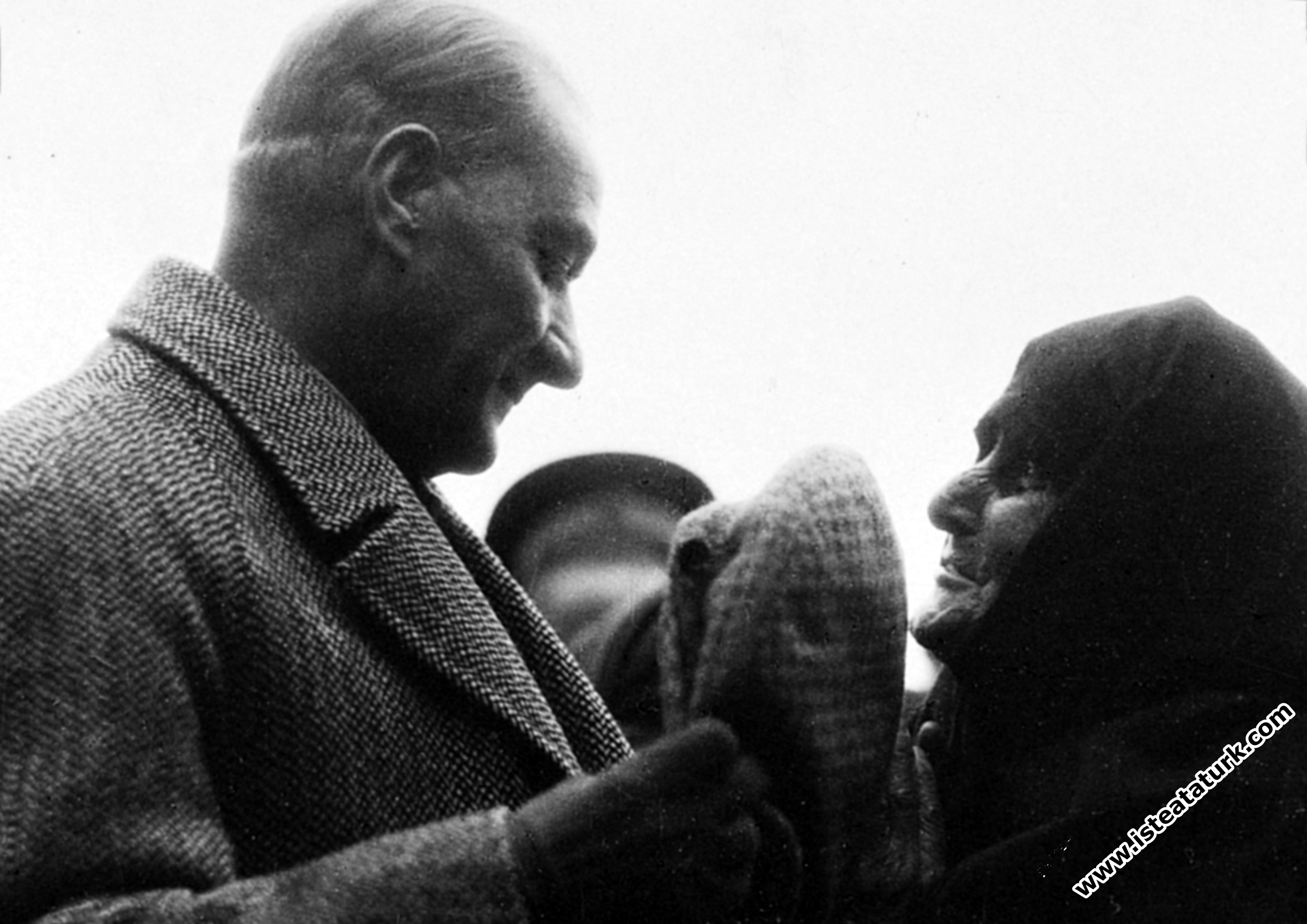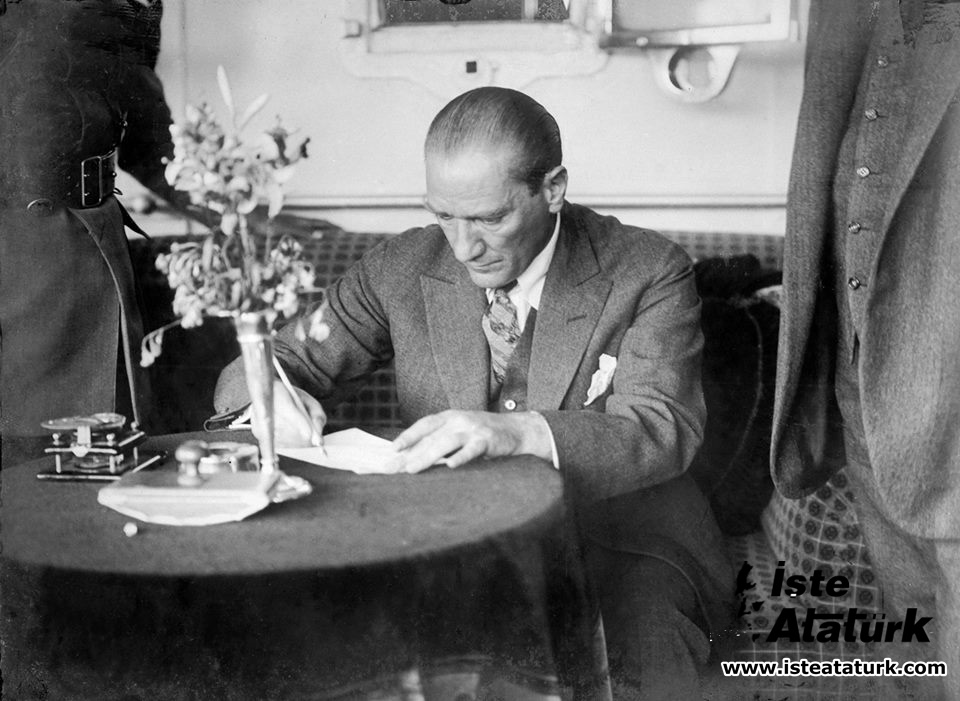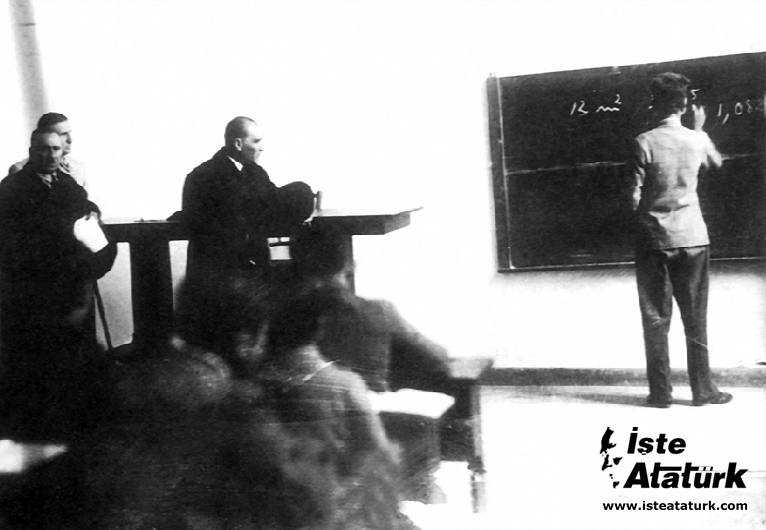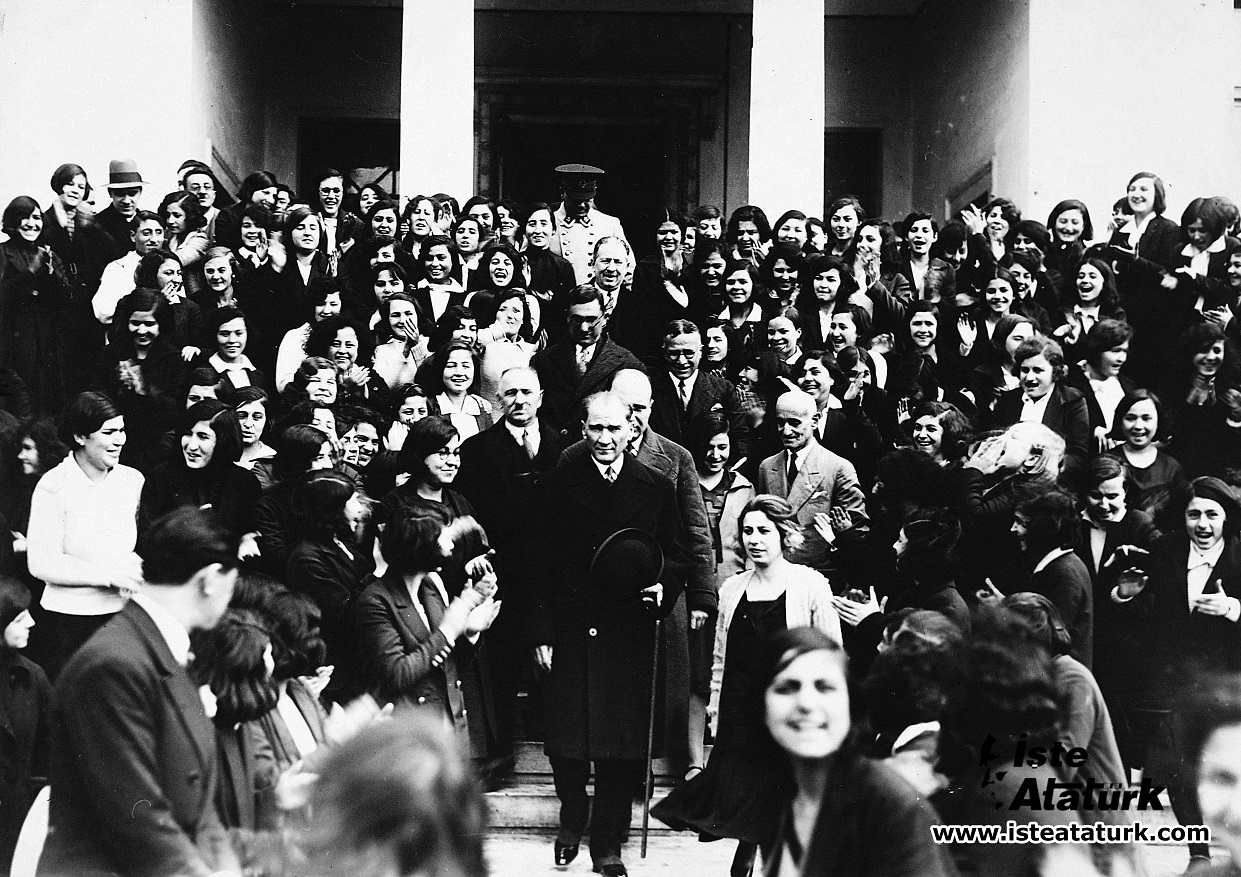
The Concept of Peace in Atatürk's National and Universal Dimensions
Character Size
“There is death and destruction in a country without freedom. The mother of all progress and liberation is freedom.” Mustafa Kemal Atatürk
THE CONCEPT OF PEACE IN ATATÜRK WITH ITS NATIONAL AND UNIVERSAL DIMENSIONS
Along with human existence, it has found itself at war. This war he fought against nature for the first time, and then his environment, was essentially aimed at continuing his life in the most ideal way he longed for. It was perhaps the most pleasing of the wars fought in terms of society, with its quality that wanted to be respected for these values, as well as the natural and vital rights and freedoms of the individual, gradually gaining in size. Because it was the main theme of providing continuity for the future of the individual and society to be healthy, peaceful and secure.
Was the longed-for struggle to create an ideal life doomed to failure? Or what was the "ideal"? What wasn't? “Ideal” may be perceived as a utopia, a concept that is difficult to reach. But, despite all the difficulties, is it also impossible to reach at least the closest ones to the "ideal"?
In fact, it is in the nature of the person to initiate such a war. The instinct to explore and learn the unknown... This will naturally push him to search, find, evaluate, learn and gradually reach the "ideal". In this process, while the person educates himself, he also educates and raises awareness of his environment.
While the thought of realizing the "peace" in the environment and the world from being a utopia, pushing the person to work that requires a process parallel to the same above, it also starts a happy war for him.
Making people believe that it is only possible in an environment of “peace” to be able to lead them to happiness, to make them enjoy their natural and vital rights and freedoms, to spend their seemingly long but actually short lives in unity and togetherness, in peace and security, in a way befitting the dignity of being human, and to have them believe that this is a fight. And it is the happiest of wars with its nature: War for Peace...
Moving from the point of "man" who starts and ends "war" and "peace": "War begins in people's ideas. For this reason, long before UNESCO (United Nations Educational-Science-Cultural Institution), which included in its law the inevitability of education in the realization of "peace" with the approach of "the defense of peace should also be built in the ideas of people", Atatürk in 1937 established the basic elements of ensuring world peace and in it " He emphasized the role of “education” as follows: “...if lasting peace is desired, international measures should be taken to improve the situation of people, human masses. The well-being of humanity as a whole must replace hunger and oppression. The citizens of the world must be educated to avoid envy, greed, and hatred...”1
His love for human existence, his respect for his vital rights and freedoms brought about the birth of the concept of “world citizenship” in him. After all, hasn't he spent his whole life fighting for the realization of this ideal to which he has devoted himself?
Mustafa Kemal was brought up in a chain of disasters, not a disaster called war. He has seen and experienced all the destructiveness and misery of wars and how they have driven people away from their humanity. As a result, he witnessed hopeless, unhappy, pessimistic pictures that disappeared under ruins and ruins instead of hopeful expectations and futures. The environment he lives in and the experiences he has had will push him into a long war, which adopts the principle of achieving "peace" not only in his country but also in the world. This is the natural reaction of people who aim to keep their society and societies away from the destructiveness of wars and yearn for "peace".
Following the end of World War I, Mustafa Kemal is the strategist and director of the National War of Independence, which he started this time to save his country from unjust occupation and his nation from being imprisoned.
The idea of establishing a new state in him and what the characteristics of this state would be goes back to his youth. In the disastrous years of the empire, he told his friends in 1907 that “the best solution was to establish a Turkish state before the disintegrating empire”2. And in 1908, the Bulgarian Turkologist Manolofa lists the qualities of the new Turkish State he plans to establish, saying that "one day he will achieve all the things that can be considered imaginable": "The Sultanate must be abolished. The structure of the state should be based on a homogeneous basis. Religion and state should be separated from each other. We have to leave the Eastern civilization and turn to the Western civilization. We must remove the difference between men and women. Thus, we must establish a new social order. We must remove the writing that made it difficult for us to enter Western civilization - we must accept the Latin alphabet. We should turn to the West at every point, from our clothing. Rest assured that one day we will achieve all these goals. “3
Being able to realize his thoughts on the way of establishing a modern and civilized state, which had turned into an ideal in his youth, initially necessitates the provision of "living freely and independently within national borders"4. The basic line of the foreign policy he would follow in 1921, during the hottest years of the National War of Independence, which he started for this purpose, said, “Gentlemen, there is no attack on the law of a friendly state in our foreign policy. However, we will defend our rights, our lives, our country, our honor… Turks are friends of all civilized nations… “5.
The words he said to İsmet Pasha reflect his longing for the concept of "peace" and the basic humor of the foreign policy he would follow, while he was pushing the Greek armies that had landed in Anatolia with the tricks of the Entente states and dared to invade, towards the place where they first set foot on September 9, 1922. : “Far far away, I see the distraught Greek soldiers with sword leftovers rushing towards the Aegean shores to take their weapons and save their lives. Know this, İsmet: We have come to terms with the Greek army by devastating them. But this will end here, I will soon lay the foundations of Turkish-Greek friendship by inviting the Greek leader Venizelos to our homeland. Because, for the safety of the Aegean and the whole world, the Turkish and Greek nations must live amicably and side by side...6
Atatürk, who set a barrier to the expansionist ambitions of the West with the war he waged, said, "Colonialism will disappear from the face of the earth and a new age of harmony and cooperation between nations, which does not discriminate against any color, religion or race, will prevail",1 believing that it will disappear from the whole world. He longs for a concept of “peace” that has reached universal dimensions that will bring it together in an environment of love, friendship and brotherhood. In such a cohesive world, people will own up to all problems, whether they are their own or not, and resolve them before they reach threatening dimensions for all humanity.
“Peace” is inevitable not only for its own country, but also for other countries to realize their economic development. Because he has convinced himself that there can be no situation that can be explained more easily than that a country, which is undergoing radical reforms and developments, desires peace and tranquility both in itself and around it.
Following the end of the National War of Independence, in line with these thoughts, he started friendly relations with all countries from far and near, including those that occupied his country a few years ago and meant for independence.
Problems that could not be resolved at the Lausanne Peace Conference were resolved through peaceful means through diplomatic attacks on international platforms, in accordance with the basic spirit of the foreign policy pursued, by closely monitoring and evaluating the developments in the world political conjuncture. The problem of minorities with Greece, the Mosul problem with England, the new status of the straits, and the Hatay problem with the French, whose diplomatic initiatives were initiated during his lifetime, but whose solution was prolonged after his death, are just a few of the examples.
Emphasizing that there is no attack on the law of any state and expansionism in his foreign policy, Atatürk rejects the policies of Islamism and Turanism, which he sees as historical examples: The results of the ambitions of establishing a single world state that includes all humanity, regardless of race, are written in history... The theory of creating a humane state by making people forget all their special feelings and connections and uniting them in fraternity and full equality has its own conditions. There can be no greater error than being a dreamer in the face of the general conditions of the world today and the facts that centuries have placed in minds and characters, this is what history says, science, reason,
The peaceful policy determined by the good neighborly and friendly relations to be established with the surrounding and world countries will also create the dynamics of social, economic and cultural development initiatives in order to create a peaceful and happy society that will increase the living standard of the society in the country, secure its future.
At this point, he does not isolate domestic policy from foreign policy, on the contrary, he emphasized that they are in constant interaction with each other, that the first is based on the second and that it should be compatible with it.11
The concept that Atatürk considers as the basis for ensuring social peace in domestic politics is "freedom". Because, only in a liberal environment, people will be able to produce and contribute to the intellectual life and economic life of the country.
The emergence of the concept of “freedom” in him goes back to the days when he finished the Military Academy and went to the continent. The concept he tries to reach while taking his place in the reactions against the oppressive administration is "freedom". The following words he said when establishing the Thessaloniki branch of the Vatan ve Hürriyet Cemiyeti in 1906 are significant: “In a country without freedom, there is death and destruction. Freedom is the mother of all progress and liberation.”12
This is the first and inevitable condition for reaching contemporary civilizations based on reason and science.
In the face of the disintegration of the Ottoman Empire and the captivity of the nation, the concept of "freedom" will begin to accompany the concept of "independence" this time. In fact, these two concepts interact in Him, they are complementary to each other.
Following the end of the National War of Independence, work will begin on the creation of a free society in all respects. The main goal here is to define and determine the indispensable natural and vital rights and freedoms of a person, the necessity of being contemporary.
However, this is only possible with the harmonious determination and meticulous implementation of laws, state, society and individual relations, mutual rights and duties, which are the products of the synthesis of free will and rational thinking within the limits of scientificity of the democratic system.
Believing that there is peace, happiness and progress in societies that consciously establish and maintain this harmony, he emphasizes that national sovereignty is “the mainstay of freedom, equality and justice”14.
While trying to achieve peace at home, it starts from the concept of national sovereignty, in other words, liberating the individual. Because, in democratic regimes where the sovereignty is in the nation, the person will think freely, research, evaluate, eventually reach the truth and educate.
A question then arises: What is freedom?
Atatürk divides freedom, which he describes as “a person's making all kinds of dispositions without infringing on those of others”15: i) Freedoms related to one's objective interests. For example: Personal, protection of home from attack, possession, trade, work, craft, etc. 2) Rights of the person in his intellectual life. For example: belief, assembly, press, forming a society, education.16 The freedom of belief that we will especially focus on here, everyone has the right and freedom to think what they want, to believe what they want, to have a political opinion of their own, to do or not to do the necessities of a religion to which they belong. However, it was emphasized that the rituals could not be against public order and moral rules and could not be transformed into a political demonstration.
The freedoms that form the basis of the democratic system, such as the freedoms of criticism, assembly, and the press, have been meticulously defined and their limits determined.
The Principle of Populism, in which all these freedoms find expression, has taken its place in the Constitution as a complement to the other five principles that make up the characteristics of the new Turkish State, and as an indispensable condition for social solidarity and social peace.
Following Atatürk's death, the new Turkish State, in line with his principle of "Peace at Home, Peace in the World", has been meticulously loyal to the principles of domestic and foreign policy, both protecting social peace and continuing its contributions to regional peace.
1 Atatürk's Speeches and Statements, C.III., 3B., Ankara, 1981.p.99
2 AF Cebesoy, My Classmate Atatürk, Istanbul, 1967.p.108
3 Ord. prof. Dr. Sadi Irmak, Atatürk-The Opening of an Age, İnkılâp Publishing House, Istanbul, 1984.S. 5
4 Atatürk's Speeches and Statements. CI,3B. Ankara, 1981.p. 184.5 Ibid., p.236.
6 Sadi Irmak, Atatürk's Echoes in the World. War Academy Atatürk Special Bulletin, Ankara, 1981.
7 Mehmet Gonlubol-Cem Sar, Ataturk and Turkey's Foreign Policy. Meb. Arrow. Istanbul, 1973.
8 Atatürk's Speeches and Statements. CI, 3B.Ankara, 1981.S.356.
9 Gazi Mustafa Kemal, Speech (Discourse).C.II (1920-1927). Ankara, 1984.S.586.
10 A.g.e., s.587.
11 A.g.e., s.585.
12 Atatürk's Speeches and Statements. CH, 3B. Ankara, 1981.SI
13 Atatürk's Speeches and Statements. CI 3B. Ankara, 1981.S.308
14 A.g.e., s.308.
15 Prof. Dr. Disaster, Civil Information and MK Atatürk's Manuscripts. Ankara, 1969.S.50.
16 A.g.e.,s.56.
17 A.g.e., s.56.
18 A.g.e., s.57. v.d.
Prof. Dr. Ünsal Yavuz
Source: ATATÜRK ARAŞTIRMA MERKEZİ DERGİSİ, Sayı 16, Cilt VI, Kasım 1989
